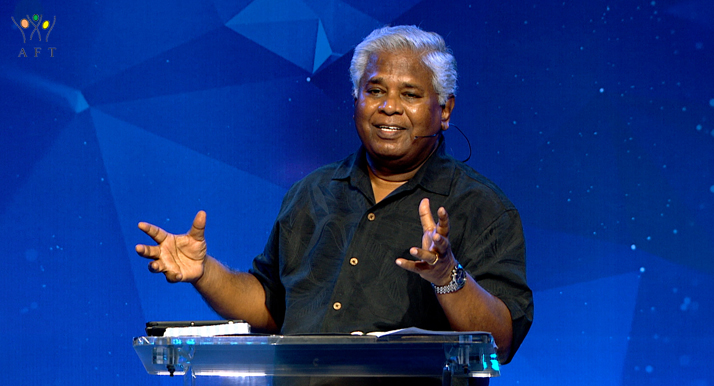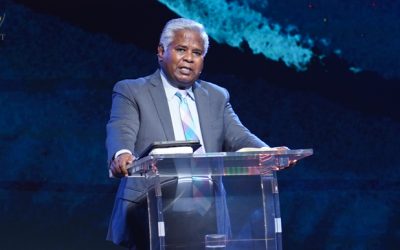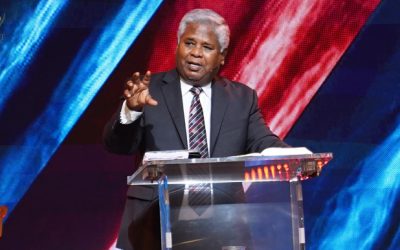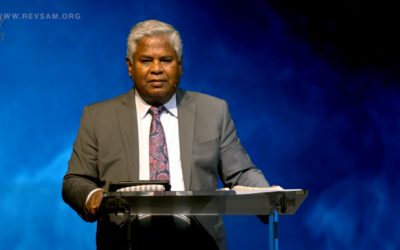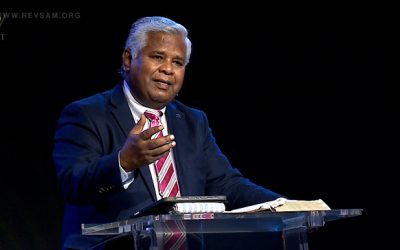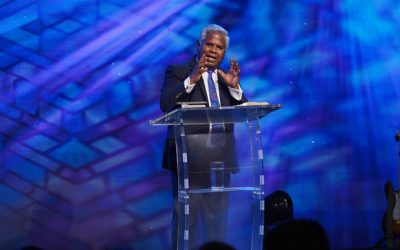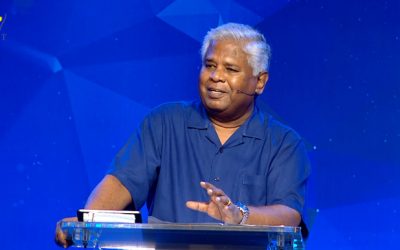
Abounding Grace (Vol. 42) – Grace to the Barren
Sunday English Service – 31 OCT 21
Transcript
Please turn with me to Galatians, chapter 4 and let me read to you from verse 21, all the way to that you 31. Galatians, chapter 4, verse 21, all the way to verse 31: Tell me, you who want to be under the law, are you not aware of what the law says? For it is written that Abraham had two sons, one by the slave woman and the other by the free woman. His son by the slave woman was born in the ordinary way, but his son by the free woman was born as the result of a divine promise.
These things are being taken figuratively: The women represent two covenants. One covenant is from Mount Sinai and bears children who are to be slaves: This is Hagar. Now Hagar stands for Mount Sinai in Arabia and corresponds to the present city of Jerusalem, because she is in slavery with her children. But the Jerusalem that is above is free, and she is our mother. For it is written:
“Be glad, oh, barren woman, who bears no child; break forth and cry aloud, you who have no labour pains; because more are the children of the desolate woman than of her who has a husband.”
Now you, brothers, like Isaac, are children of promise. At that time the son born in the ordinary way persecuted the son born by the power of the Spirit. It is the same now. But what does Scripture say? “Get rid of the slave woman and her son, for the slave woman’s son will never share in the inheritance with the free woman’s son.” Therefore, brothers, we are not children of the slave woman, but of the free woman.
Well, when you read this, it sounds all complicated and tough to understand but it’s actually a wonderful passage, probably one of the greatest passages that explains the doctrine of God’s grace in the whole Bible. And so, we’re going to look at this today.
The thing that is probably the issue here, when you look at this passage immediately, people look at one thing here, in verse 24, where Paul says, “These things may be taken figuratively”, and they get side-tracked into all kinds of things. Because it says, “These things may be taken figuratively”, they think this is a wonderful passage that tells them how Bible must be taken. Some people think that whole bible must be taken figuratively, you know, and not literally. And there’s a trend towards that these days. And a lot of people say, “Well, you read your Bible, literally; I read my Bible, figuratively, you know, that’s a difference. We each read it the way we want to”, they say. But really, if you look at it deeply, and really truly, you will find that just because Paul says that he is taking figuratively, it doesn’t mean that he does not take it literally. He takes it literally also. But he sees the spiritual truth that it teaches and he’s referring to that here. You should not get side-tracked by these issues. You know, people whenever you read this passage, I believe that this is the thing that people immediately go to, even those who comment on these verses. In writing, they also immediately pay attention to this and say, there’s a wonderful passage that shows us how the Bible must be taken, and particularly those who believe that everything must be taken only figuratively, only in the spiritual sense and not in the literal sense. They say the whole Bible must be taken like this. But this passage is an amazing passage about grace. We’re talking about the abounding grace. Paul says, “Where sin abounded, grace did abound much more.” It means sin comes into people’s lives and abounds in their lives, in the sense that it overcomes them, rules over them, destroys them and ruins their life. But when the grace of God comes in, in salvation, the grace of God repairs and restores everything that has been destroyed by sin and ruined by sin. But more than that, it makes everything more beautiful than it ever was. It makes it wonderful and beautiful. And that’s what we’re talking about now; abounding grace is our subject. That’s what we’re talking about. And this is an amazing passage that shows how grace comes and abounds in people’s lives and changes them.
So, you need to understand that there is a context to this verse, to this passage. Why Paul is taking up this issue of how Abraham had two sons, one by a slave woman, and one by the free woman, and then begins to explain what these things mean, and so on. Why is he going into all these things? Looks like all complicated stuff. Why is he going into all this? He’s going into all this because he has a great concern for the Galatians. The Galatians are the people that live in a region called Galicia, in the area that is presently called Turkey. And Paul had gone there and preached the Gospel to them in his first missionary journey and churches were started as a result of Paul’s ministry. A lot of Gentile people came to Christ and churches were started. And he preached the Gospel this way to them. His Gospel essentially was this: that you put your faith in Jesus, He has done everything. You cannot be saved by your works; you can only be saved by what He has done on the Cross of Calvary. Paul has been in a religion, where they sought to make themselves righteous before God, by their own works and Paul was one who tried that, and finally concluded after he met Jesus, that that is not possible at all. You cannot, by your own works, present yourself as righteous before God. It will never work! So, now his Gospel has this as the central fact of his Gospel. He says, “It’s not your works. It’s not by your efforts, that you become righteous. You put your trust in Jesus and what He has done on the Cross of Calvary, that He bore your sin, and took your place as your substitute. That’s how you become righteous.”
So, He has preached that Gospel to them, said, “Not by your works, but His work. That’s what saves you. So, you just come and put your faith in Jesus and when you put your faith in Jesus, you get saved. The works follow that salvation, since now you’re saved. Now God gives you the power to do the good works, that He has called you to do and the good works that you must do. Good works don’t get you salvation. You get saved, and then you do good works.” That’s the way he has taught them. Put your faith in Jesus, get saved, and that will result in good works, is his Gospel. After he preached that, gave these people baptism and established the church and went away from that region, there were others that came in there. They are the legalizers, they’re legalists. These people wanted to draw these people into Judaism and they came in preached another gospel to them, because in the first chapter of Galatians, you’ll see Paul’s big rebuke to those people. He says, “If anybody comes and preaches any other Gospel, other than what I have preached, let him be accursed,” he says. He’s really mad, very angry at these people that have come and ruined everything. What did they do? The gospel that they preached is flawed. It’s going to ruin these people. What did they preach? They preached in essence this way – they said, you put your faith in Jesus. That’s correct. Yeah, you believe in Jesus. They’ve also believed in Jesus. But then you add your own works to it. Put your faith in Jesus, and you also add your works with it. Because without faith and works, you cannot be saved. So, you add your works with it, and that will lead you to salvation. So, they put the gospel also in three points, that is: believe in Jesus and show your righteous good works, then you will be saved. Paul says, “Believe in Jesus, you will be saved, then as a result, you do good works.”
Now, you may say, “Well, what’s the difference?” The difference seems to be a very slight difference only. He’s saying that if you put your faith in Jesus, you will be saved and then it results in good works. These people are saying, you put your faith in Jesus, follow it up with good works, then you will be saved. There’s a big difference between the two. What their gospel will do is, it will take away all assurance of salvation from them. Because once you rely on your good works to be counted as righteous before God, once your good works come into picture, then you can never be sure whether you’ve done enough good works or not. There’s not going to be even one day, where you can be sure that you have done enough good works to qualify for your salvation. You will lose your assurance of salvation. You will lose all peace. You will lose the confidence that when you pray, God will hear you, so your prayer life goes because if you’re not confident that when you pray, God will hear you, then why would you pray? A lot of people don’t pray because they don’t believe God hears their prayer. That’s why they don’t pray. If they believe that God hears their prayer, they’ll pray more. If they believe like Jesus said, “Ask, and whatever you ask, you will receive. If you abide in Me and My words abide in you, ask whatever you will, the Father will give it to you.” 1 John 5:14 and 15 says, “This is the confidence that we have in Him, that, if we ask anything according to His will, He hears us. And we know that we have the petition that we desired of him.”
Now, see, when you’re confident that God hears your prayers, you will be praying all the time, because you know that you can get things done in prayer. When you lose that confidence, when you begin to doubt yourself, when you begin to doubt your qualification to ask, then you begin to stop your prayer life; your prayer life gets affected. That’s why a lot of people end up writing to some evangelist in town, making their request for prayers. They’re hoping that he will pray, that he has some special access to God, you know. And these evangelists’ mailboxes overflow with prayer requests. If you ask me, “How do I know that?” They tell us that. Thousands of letters come every day, people asking for prayer. Well, if people that don’t know God, if they ask for prayer, that will be something good. But these are people that are church-going people, carrying Bible and read the Bible, and so on. They are the ones that are writing because they are very confident that their prayers won’t be heard, that some gifted man of God has to pray for them and they believe that his prayer will be heard or her prayer will be heard. So, they’re seeking the help of these people that will pray for them. This is the problem. You’ll lose all confidence, no assurance of salvation, no happiness, no peace because fundamental thing is, you are not sure whether God accepts you. How can you be sure that God accepts you when you rely on your works? Your works, no matter how well you do it, there’s always some flaw somewhere, there’s always some doubt somewhere, that you have not been good enough. And that becomes the root cause of all your failure in Christian life.
Now, people are facing a great danger, these Galatians to whom Paul has preached the Gospel. Now, if you are a person who’s going and preaching to people that are never heard the Gospel and bringing people to Christ, and someone else comes and does that, you will be really mad, you know. Paul is really mad because these people are ruined. He has taught them that they are children of God, that God loves them, God has accepted them. He has taught them to pray, and he has taught them to live a spiritual life victoriously, but here, these people are coming and turning everything upside-down by this wrong way of preaching the Gospel. And that is why he is writing, that is why. See, if you read verse 19 and 20, you’ll know the context. I read to you from verse 21 but if you read 19 and 20, and then start with 21, you will know what he’s talking about.
Let me read to you from 19. He says, “My little children; My dear children”, he says, “For whom I am again in the pains of childbirth until Christ is formed in you.” What does he mean? He means that he already had the pains of childbirth, to bring them into Christ. Before he came to preach to them, he was literally in pain of childbirth, literally. He was praying for them. It’s like giving birth to a child, like a woman giving birth to a child. He was “in travail” for them, as the old King James Version says. Like a woman would travail in childbirth. He was travailing, he was praying and he gave birth to these people. He’s become the spiritual father of these people, that’s why he calls them, “My little children.” So, he has already travailed for them. He says, “Now I am again in the pains of childbirth.” This time why is he in travail? He is in travail, this time, for Christ to be formed in them. He was in pain the first time to bring them into Christ. Now, he wants Christ to be formed in them, that is their thoughts and their works and their power, and everything must come from Christ. They must be so filled with Christ. They must be so full of Christ, that’s what he is in travail about. He wants Christ to be formed in them.
So, he says, “My little children, I’m again in the pains of childbirth until Christ is formed in you, how I wish I could be with you now, and change my tone, because I’m perplexed about you!” You can see is mad. He says, “I wish I was there, in person and change my tone.” You know what that means, you know? I can be stricter with you, I can really raise my voice with you and emphasize these things to you, and speak to you more sternly, and convince you of what I’m trying to convince you because you’re in great danger”, he says. “I’m perplexed about you!” He’s doubting now, their faith in God and their faith in him as a preacher and so on. Then he says, “Tell me, you who want to be under the law.” See, now he doubts these people. He thinks that they want to go under the law, they want to follow this legalistic teaching of these people that are teaching the law. He says, “Now, you want to be under the law, are you not aware of what the law says?” See, you want to go on live under the law; I’ll tell you what the law says. “Do you know what the law says?” he says. Then he says, “For it is written that Abraham had two sons, one by the slave woman and the other by the free woman.” He goes on into a big story. He wants to explain to them what the law says. And that’s where we are at. What is he saying about the law? What does the law say? This complicated passage, seemingly complicated passage that I just read to you, is about the two sons of Abraham, one son born by a bondwoman, a slave woman and the other son born by a free woman, named Sarah. The bondwoman was Hagar, and you know their story. So, it’s about the two sons, first of all. Then he talks about how the two sons represent two different eras or two different covenants. The Old and the New Covenant are two different approaches to God that people use, one by works the other by grace. That is why he says it must be taken figuratively. And then thirdly, he gives two different applications. Two sons, two different approaches to God or two covenants, and two different applications. And that’s what we’ll look at. And once you look at that, you will really understand what this is all about. And there is hidden behind all of this a wonderful, great message of grace, that you will be thrilled about, when you understand it.
Let’s talk about the two sons that he talks about first. Verse 22: For it is written that Abraham had two sons, one by the slave woman, and the other by the free woman. Now, why does he bring up this issue of ‘slave woman’ and ‘free woman’ and the sons that they had, the two different sons that they had? You see, you read the whole book of Galatians, the whole book of Galatians talks a lot about Abraham, particularly the third chapter is full of Abraham’s stuff. Why is he talking so much about Abraham? Why does he bring Abraham into the discussion here and in third chapter also, he brings Abraham into the discussion? Why? Because those people that came and taught the wrong doctrine seems like they had come and talked about Abraham. They used Abraham as the foundation for their wrong teaching. They used Abraham to tell these people, these Gentiles, that they must be circumcised because Abraham was the first one to get ever get circumcised. God told him to circumcise himself, his son, and all of his family and from then on, all the Jews started circumcising their children. That’s where circumcision started. And they are called Abraham’s children. And they figured that if you are circumcised, then you are Abraham’s children, otherwise you’re not Abraham’s children. And now you want to get Abraham’s blessing. You cannot get Abraham’s blessing because you don’t have Abraham’s circumcision. These Gentiles, they’re not circumcised. How can you get Abraham’s blessing without Abraham circumcision? – is their point. You want to get Abraham’s blessing, then you got to do what he did. He was circumcised, you get circumcised. That’s their whole point. But the whole point of the Apostle Paul was that Abraham was blessed long before he was ever circumcised; circumcision came later, blessing came earlier. Plus, he teaches in the third chapter, that it’s not all those that are born physically as descendants of Abraham that are to be recipients of the blessings of Abraham. You don’t qualify for the blessing of Abraham, just because you come in that lineage of Abraham, physically. You qualify for the blessing of Abraham because you have the faith of Abraham. He says that in verse 7, in chapter 3. He says, “Those that are of faith are the children of Abraham.” Not just because you’re born in that lineage; those that are of faith are the children of Abraham. And how does Abraham’s blessing come to you, the Gentiles? He says, “As it is written, Christ died for you by hanging on a tree.” He says, in verse 13, he says, “Christ has redeemed us from the curse of the law having become a curse for us, for it is written: Cursed is everyone who hangs on a tree.” He’s talking about the Cross, Jesus hanging on the tree. He says, “The Old Testament says, “Cursed is everyone that’s hanging on a tree.” And Jesus hung on that tree, the Cross, taking our cursor upon Him, and in that way, He redeemed us. And what did He give us by redeeming us in that way? “So that the blessing of Abraham”, verse 14 says, “might come upon the Gentiles in Christ Jesus”. So that the blessing of Abraham may come in and through Jesus to the Gentiles.
How does the blessing of Abraham come to the Gentiles? See, the blessing of Abraham was given to Abraham, and to his seed – in singular. He talks about it in verse 16, in third chapter. He says, “The blessing of Abraham is to Abraham and his seed”. And he points out, he says, “Seed” is singular, not plural. So, it refers to one person. So, the promises of God’s blessing were to Abraham and to one other person only. And that other person, he says, is Christ. That’s all! Nobody else gets it. “To Abraham and his seed, Jesus Christ”. And then, he says, in verse 29, he says, “If you are Christ’s, then you are Abraham’s seed.” See, if you’re of Christ, if you are in Christ, then you are part of that seed, to whom the blessing belongs, then you are heir to the promises, heirs according to the promises. So, that’s how you end up with the blessing of Abraham, not like these people are saying, not by going through circumcision and all the rituals. You qualify for blessing because you have the same faith of Abraham. Blessing comes because Jesus died on the Cross, for you, blessing was given to you, and how does blessing come to you? Because the blessing is promised to Abraham and to his seed. The seed is Christ. And once you put your faith in Jesus, come into Christ, you are part of that seed. You’re in Christ, therefore, you’re a recipient of the blessing of Abraham, heirs according to the promise. So, that is why he brings Abraham into this whole discussion here. Again, in chapter 4, he brings Abraham here.
Now, you need to understand something about the Galatians and the background of these people, what kind of life they lived. In order to understand what Paul is talking about here. The Galatians were Greeks. They lived in what was called Greco-Roman world; the Greeks influence just got over and the Romans are beginning to rule the world. That is when Jesus lived and that is when Paul breached also. So, in the Greco-Roman world, these Greeks, they did not know the law of God, they didn’t know the Word of God. They did not live according to the will of God. They lived pagan life, a life as they wished, according to their whims and fancies. Two things characterize the life in the Greco-Roman world, they say, two things. One is lasciviousness. Lasciviousness is lustful life. Whatever they looked at, whatever they desired, they wanted to have. No restrictions. They’re out loose, to enjoy life to the fullest, satisfy whatever their lust demanded. It was the lustful life. That’s what lasciviousness is all about.
Secondly, it was a cruel life. Cruelty was the character of that kind of life in the Greco-Roman world. Let me explain. You know why, in the first three centuries of Christianity, Christianity spread and expanded and grew at such a rapid rate? Because they say, women turned to the Christian faith in great numbers, in the beginning. Why would the woman turn to Christ in those days? Because Christianity came in, the teaching of Christianity— You see, a Greco-Roman world was filled with this idea that every man can have any number of women that they wanted, a relationship with any number of women. It is not a big thing; it is no issue. It’s not wrong at all, according to their way of thinking. And women felt that there was a tremendous injustice done to them in this way, that the men are free to do whatever they wanted, but they put all kinds of restrictions on the women. So, they felt that they were not given justice in that way. And their families were ruined because of this because these men had many women. And so, they were busy with that kind of stuff and they did not take care of the children, they didn’t mind their families well, marriage, relationships were not stable. There was a lot of conflict there, a lot of problems there. Therefore, marriage was difficult, family life became difficult, children’s’ life were ruined. And in a situation like that, Christianity came in and they were preaching, one woman for one man, that kind of teaching. One woman for one man, and that sexual relationship is not to be allowed outside of marriage bond. This is what Christianity thought. And women felt empowered by it. When that came in, women felt that the Christian faith was speaking for them, for justice for them. It was on their side and it was speaking about good families and so on. And when men turned to Christ, when men began to listen to the teachings and give their lives to Christ, and turn from their wicked ways, and follow this rule, and follow this kind of system, and way of thinking and belief and way of life, families got straightened out, families were blessed. They had wonderful families. And the devastation that happened because of polygamy in that society, were now under control in societies where Christianity spread. They had wonderful families, and this was an attraction for women in that society. They looked at Christians and they said, “Wow, that’s the kind of family I want to have; that’s the kind of marriage I want to have; that’s the kind of life I want to have.” So, they turned in large numbers to Christianity.
Secondly, the cruel nature of their life in that world was something that is very evident by various things. One of the things was, they had such things like we have now – the pandemic, you know, and they had epidemics in that society. Sometimes, people will die in large numbers. When some kind of thing or a disease will come and spread everywhere and so on. And when such things happened, and people started to die, it was not unusual for these families to pick their own family members up who were sick and out of fear of contamination, they will take that person who’s already been infected, and take them far away from their house and leave them out on the street to die. It may be a husband, it may be a wife, it may be a child, just because they didn’t want to be contaminated, they didn’t want to get infected, they didn’t want to risk dying, they’ll just take their family member. Just imagine how cruel this is. They take their own husband or wife or child, mother, father, whoever is contaminated, whoever was infected; they will go and leave them out in the street somewhere to die. So cruel it was. But Christians were not like that, it seems. Christians will take care of their sick, minister to their sick, help their sick recover. And they will take great risks to do that because there was love. There was care given and this was a big attraction.
And the other thing was, the rate of infanticide among girl children, female children, was very high. They say, in that society, when Jesus was living, when Paul was preaching, there were 140 men for every 100 women in the Greco-Roman world, generally. 140 men for every 100 women. And when Christianity spread, and really had its influence in those societies where Christianity had spread well, these ratios were 100 to 100, 100 men, there was 100 women, nearly. That kind of ratio. You can see the marked difference between a society which was Christian and a society which was non-Christian. They talk about one particular town, in the time when Jesus lived and Paul lived and so on. There was one particular Greek town around the time of Christ, there were 600 families and most of these families seem to have seven, eight or nine children in them. But only six out of the 600 families had more than one female child. All the rest of them had male children, mostly and if they had female children, it was only one child.
Only six families had more than one child. Just imagine what was going on. They were killing female children as soon as they were born. There are some documents, letters that are available for us to read, these days, from back in those times. There’s a letter from an Alexandrian businessman, from Alexandria in Egypt, who wrote to his wife, while he was on tour in business. His wife was pregnant and was ready to deliver a child and he writes to her saying, “I’m going to be back within another three weeks or so. But I want you to remember one thing: if the child in case was born, before I came, be sure to throw the child out.” He’s written it in a letter and it’s preserved as a document. Throw the child out if it was a female child. That was the kind of society – cruelty is the character of that society; cruelty and lasciviousness; lustful living, and cruel living. Don’t care for nobody. A very difficult world to live in, you know. You wish you didn’t exist at that time, you know, that was the kind of time it was. If you were sick, or if you were a woman, you were the most unfortunate ones to live in that society. That’s the way it was. And because these Galatians came from that kind of a background, that kind of a world, you know, people coming from sinful lifestyle, and all of us are born in sin, raised in sin and so on, in that way.
They say all human beings have deep down in their hearts, a sense of shame. That sense of shame dominates them, dominates them very much. And that shame is a very big factor in human life. And the Bible teaches about it. That’s the thing about it. Bible teaches about it; in the world, they don’t talk much about it. They don’t want to talk about it; they don’t want to discuss it but it’s there. Deep down in the heart of man is a sense of shame because of the way he lives. He knows that he’s wrong, somehow. Somehow, he knows that something is not right within him. Have you seen people talk about how there is injustice, how there is wickedness, how people are unfair and all that? See, there is a sense of justice, and morality in man. Therefore, when they live the way, they want to live and when they live as they like and when they fulfill their lust and live cruel lives, how can they be at peace? There is something that disturbs them there. They have a sense of shame inside of them.
Do you remember the movie, ‘Lion King’? In that story, there is a point at which the daddy lion, Mufasa, dies and the little lion, Simba is there with the father, dead. And the trim lion, Simba, has an uncle who’s a cruel lion. He comes in there, and he wants to crush this little lion. He wants to make him feel bad, cripple that little lion with guilt and shame. So, he comes in there, and these big actors give voices, you know, and the voice sounds so good. I can’t duplicate it. And with this tremendous voice of a great actor, this uncle lion says, “What have you done?” You know, something like that. With a loud, strong voice, “What have you done?” And this little lion is just shivering, in shame, crushed, says, “Well, I don’t know. Something, somehow, something happened and father is dead”. And then that cruel uncle lion says, “Well, if you were not here, if it weren’t for you, this wouldn’t have happened. If it weren’t for you, this wouldn’t have happened.” Just imagine what anybody will feel like. And you can see that lion feel that shame, that guilt, crushed by it, filled with sadness, tremendous sense of sadness. And you can see that music played over that. And that scene is a tremendous scene of how guilty and shameful that lion feels as this uncle lion crushes him with those words. It is so real. I think, they didn’t want to do it with the people acting in it, because nobody will go see it. So, they put it in that lion story, so that he can convey this message. But this is so real; shame is so real. “It’s in everybody”, they say. It’s deep inside people. It’s there, it’s played out.
Jonathan Edwards – there’s a great preacher named Jonathan Edwards. I’m sure you’ve heard of Jonathan Edwards, tremendous preacher. And he said this; he said, “Even if there was no fire in hell, even if God had it in such a way that there was no fire in hell. If God takes away the shield around your conscience”- See, your conscience, man’s conscience, is like a shield. We don’t do a lot of bad things because there is a conscience in us, that forbids us and keeps us from doing bad things because we can’t stand the torment of our conscience. So, we keep from doing bad things. So, he says, “Even if there was no fire in Hell, if God just simply removes this wall, called ‘conscience’ from your heart, then you will start living the real way that you want to live, according to your own desires, and lusts because the wall is removed now, and you will live your deepest longings that are there. And then, as a result of that, there will be fire enough even without fire in hell, this fire is enough to consume you”, he says. “It will still be hell. Life will be hell; you don’t have to go to hell”, he says. “You will start living your life, the life that you really want deep inside of you because of your sinfulness. And that will be like living in hell”, he says.
I heard of a preacher who was preaching in the city of New York, in an area where all these sex workers walk up and down the street looking for business. And he’s there preaching, saying, “You’re going to burn in hell if you live like this? And Jesus is coming soon”, and all that. And that woman who was walking up and down, heard this and got very irritated at this guy, saying that you’re going to go to hell and burn there. So, she stopped and said, “Hey, look here preacher. What are you talking about going to hell? I’m already in hell.” I am already in hell and it’s so true. She was living in hell; she was living the way that she has chosen to live. She was living the way that she was feeling inside. Somehow, all this evil is let loose in her life and now, the fire is burning, she cannot stand it. She is being consumed in that fire; life has become hell. She doesn’t have to go to hell, life itself has become hell. And I tell you, many people have experienced that. And Galatians come from that kind of a background. They know that kind of lifestyle. And now, they’ve come and heard Paul preach and just imagine what kind of comfort Paul’s message must have been. It must have brought them tremendous comfort and peace because they come from such a bad background. Paul’s message of God’s grace must have been a soothing thing for them.
What was Paul’s message? Paul said, “You’re saved, not by your works. If it was by your works, you would never have a chance of being saved. It’s not by your works. But because of Christ’s work, because of what He has done. You’re saved. You’re saved, not because of what you’ve done; it’s because of what He has done on the Cross of Calvary so that now, in spite of everything that you’ve done, and everything that you’ve been in the past, regardless of your past, now, you are children of God, you are children of Abraham; you’re blessed with the blessing of Abraham. God shows His favour to you. God loves you. He sees you as His children, not because of what you’ve done, but because of what Christ has done. What has Christ done? He has taken your place, become your substitute and carried your sin and the punishment for your sin. The curse that was supposed to be on you, has now come upon Him, so that you may have the blessing of Abraham. This is the message that Paul preached and you can imagine the peace and the comfort that it brought to those Galatians. They’ve just beginning to enjoy the peace, the joy. And Paul leaves Galatia, goes back to Antioch and here comes these legalizers and they’re preaching the exact opposite of what Paul preached, and they are slipping back into condemnation, and into slavery, into that kind of condemnation and guilt and shame again. Because these people are saying, “Well, you have a long way to go. You can’t be a child of Abraham just like that, not just by believing in Jesus. It’s not that easy. Look at us. For years together, we’ve been washing our hands, we’ve been washing our feet, sprinkling this here and that there. We’ve been going through a whole process of purification; we’ve been observing all these rituals and ceremonies and laws. We try so hard. How can you claim to have become children of God and children of Abraham, just like that? You cannot become children of God just like that. First get circumcised! Start with all of these rituals and ceremonies. You’ve got a long way to go, man.” They lose all their peace, all their happiness, slipped right back into slavery, to that condemnation and to that unhappiness. And Paul, by writing this letter, is really bringing this incredible counterattack upon them. How does he bring it? He says, “Alright, these fellows came and taught you about Abraham and about circumcision. And about how Abraham got circumcised and you ought to get circumcised and all that. Let me teach you about Abraham”, he says.
There were two children that Abraham had, two sons. These two people, one was Ishmael, born to Hagar, the slave woman. And he was born in the ordinary way that everybody is born, by human effort. There was this girl, Hagar, a beautiful slave girl, that this old man took and used her and she bore a child for him, in the most human way possible. He had a relationship with her, and that resulted in childbirth and it was by human effort, totally by human effort. That’s what he’s saying. But after the child was born, God blessed Sarah and she also had a child. His name was Isaac. This child was not born out of human effort at all, born completely by God’s power. God took a woman of 90-years old, a woman who Paul describes as, “her womb was dead”, he says in chapter 4 of Romans. And describes Abraham as one who had a body that was dead now. So, this man’s body was just as good as dead. This woman’s womb was dead. But God, it didn’t matter to God that they were both dead, basically, almost dead, basically. The womb was dead, because “God is the one that gives life to the dead”, he says. So, he quickened Sarah’s womb that was dead. And quickened Abraham’s body that was now, just as good as dead. That’s why God waited all that time. Have you ever imagined that? God waited more than 25-years after he promised Abraham a child. Because if He had given him a child earlier, when they were younger, when Sarah could have a child, then He cannot use that to show what salvation is like or how salvation is given.
God waited purposely, all those years, until she reached 90-years of age and he reached 100-years of age, when they cried out, “It’s not possible anymore”. She comes to Abraham and says, “Abraham, I’m desolate. I’m never going to have a child. In our culture, I’m doomed and everybody’s laughing at me. I’m not going to have a child. Let’s have a child through slave woman at least, because I’m never going to have a child, not at 90-years of age.” God wanted to drive them to the edge of impossibility so that they’ll know that it’s impossible for them to have, so that they’ll know when the child is born, that it was completely 100% by God’s power, not by their human effort. That’s the purpose that God waited because He wanted to demonstrate through this, how salvation happens. It is not that all by human effort, not 1% human effort; all 100% God’s effort, God’s power. That’s how salvation happens. That’s what God wanted to demonstrate. So, they reached a point where they realized they’re not going to have a child and Sarah comes to Abraham and says, “Look, we’re not going to have a child. Let’s take a slave woman and have a child.” That was the custom in those days, that you can have a slave woman, use her as a surrogate mother. She bears your child and then, you bring the child and make her your own child. Sarah can claim the child as a child, that was the system that was in place in the societies of that time. So, they used that system in the most ordinary way, by human effort, they had this child.
So now, Abraham had a choice. To have a child by human effort, or to wait to have a child completely by the power of God. He had a choice between two things, and what did he choose? He does what everybody does, chose what his wife told him. That’s what Adam did, that’s what Abraham did, that’s what everybody does. So, he chooses, and goes that way. He decides to have a child by human effort. And that choice was the worst choice of his life. He decided to have a child by human effort. The child was born and that created a lot of problems in his life. He had a choice, but he chose that. So, Paul is saying, these two sons are two ways people approach God, people come to God. Some try to come by their own effort, by their own righteousness. That’s one way. That’s what Abraham chose. There is the other way. You come, not by your own efforts, by your own righteousness, but by the power of God, you are brought and made righteous by God. It’s all by God’s grace. These are two different ways. Which way are you going to come? The two sons represented two different ways. “One is human effort, the other is completely the power of God”, he says. And you couldn’t have done any worse than what Abraham did. He chose the human effort and look at all the problems that human effort brought him.
Now, look at what it says. Verse 21, Tell me, you who want to be under the law, are you not aware of what the law says? For it is written that Abraham had two sons, one by the slave woman and the other by the free woman. His son by the slave woman was born in the ordinary way— he’s born just like any other child is born. But his son by the free woman was born as the result of a promise, completely by the power of God. These are two different ways. These things may be taken figuratively. “These things tell us a spiritual lesson”, he says. For the one for the women represent two different covenants. One covenant is from Mount Sinai— look at how he describes it. One covenant is from Mount Sinai – where the 10 Commandments were given and so on. And bears children who are to be slaves. This is Hagar. The child that was born to Hagar is a child of a slave. Now Hagar stands for Mount Sinai in Arabia and corresponds to the present city of Jerusalem, because she is in slavery with her children. What a way to put it. He says, “This Hagar corresponds to Mount Sinai in Arabia and corresponds to the present city of Jerusalem”. He is talking about the Jerusalem who the Jews belong to. “The whole place is in slavery with their children. That is where this whole idea of approaching God by your works, by your righteousness, comes from. They’re all under slavery. They follow that system, the law, they want to become righteous by the law, by their own works”, he says, “That’s Jerusalem”, he says. “But the Jerusalem that is above, is free. There’s another Jerusalem that’s above, and that’s free”, he says. And she is our mother. You and I are born from that Jerusalem, come from that Jerusalem; she is our mother. We are citizens of that heaven. Now, wherever you’re a citizen of, that is where you get your rights and privileges from. So, if you’re a citizen of a country where everybody’s taken care of, everybody has is assured of every good thing, then you’re very fortunate, because they’ll take care of you. They’ll take of all your medical expenses; they’ll take care of your retirement and they’ll have plans for everything. He says, “We belong as citizens of heaven; she’s our mother. That Jerusalem above, she’s free. We don’t belong to this slave system.” He’s pointing out to the Jerusalem from where they all come from, the Jerusalem that they revere. He says, “That’s where this system came from, that enslaves everybody but our Jerusalem above is free. She’s our mother”, he says.
In what way is the people, the Jewish people, are slaves? He is telling them that’s an enslaving system because if you want to become righteous by your works, then you get into the slavery system because now, you’ve got to produce works. You know what a slave is? He doesn’t have any options. He’s got to work. He can’t get up on morning and say, “Today, I want to have a holiday”. No. You’re a slave; you’re bought with a price and you serve your master at his will; you don’t have a will. You’re not allowed to have a will. You’re a complete slave. You just do whatever he wants. You have to work. If you choose to come by your good works, you have to work, you have to prove yourself, you have to prove your righteousness. You better bring your righteousness. You better know that your righteousness is the thing that is expected. You better come up with it! You better try very hard. See, that puts you in slavery. You become all tensed up. You’ve got to produce now; you’ve got to be absolutely right; you’ve got to be 100% right. And I’m here to tell you that no one ever succeeded in making themselves righteous before God. No one ever succeeded in following the 10 Commandments. The 10 Commandments were not given for that purpose, so that you can use it and prove yourself as righteous before God. It was given to prove to you that you are a sinner; you can’t do it because you’re a sinner. You’re incapable of doing it and proving yourself righteous before God. And if you’re trying, you’re trying in vain, to prove yourself as righteous. That’s the whole point of this thing. That’s where the ‘slavery’ thing comes. Whoever is under the law, they become slaves. They’ve got to do it. They’ve got to do good works. They’re obligated to do good works. That’s the only thing that’s going to save them. They better come up with it, otherwise they’re doomed to hell. That’s their plight. That’s slavery.
But if you put your faith in Christ, immediately you’re liberated. This is liberty. You’ve now come into liberty, by putting your faith in Christ because you’re not all tensed up. You don’t have to come up with good works to qualify for salvation. You don’t have to prove yourself. Nothing. You come by faith in what He has done. You come by faith in the grace that He has provided. You don’t have to prove anything. You’re accepted already. You’re in Christ. You’re accepted already. See, that’s liberty; you’re free now. Free from that bondage, free from having to prove yourself, free from trying to do everything right, and prove yourself. Now, you’re accepted in Christ Jesus. That doesn’t mean you don’t do any good works. You now, do good works without having the obligation to prove anything. You do your good works because you now have a new nature. God’s grace has given you His power to do it. Therefore, you do it. You do through a different perspective. You don’t try to prove something. You’re not trying to prove yourself as righteous. You do it because you have the righteousness of Jesus given to you. You do your good work. Totally different ballgame. Totally different perspective. This is liberty; that’s slavery. What do you want these days? Do you want slavery or do you want liberty? That’s the whole point he’s making.
Now, the next verse, verse 27, is the most amazing verse. He says, For it is written – And now he’s referring to Isaiah 54:1 (Isaiah 54:1). What does it say? He says, “For it is written”, and he quotes Isaiah 54:1. “Be glad, oh, barren woman, who bears no child; break forth and cry aloud, you who have no labour pains; because more are the children of the desolate woman than of her who has a husband.” What does this mean? See, the Bible sometimes puts it like this and you have to understand it figuratively. It is talking about spiritual truth, figuratively. He says, “Be glad, oh, barren woman”. In other words, he’s saying, “Be glad, those of you, who have found out that by your own righteousness, you cannot come to Christ. You cannot produce any fruits out of your own works. You’re like a barren tree. You’ve realized your worthlessness, your barrenness, that you cannot produce anything by your own works. Be glad!” he says, “if you have realized that. Be glad if you’ve born no children; break forth and cry aloud if you’ve never had labour pains”. What does that mean? If you’ve never had a knowledge of how change happens on the inside, you know. What is a labour pain that women conceive in her womb? A child grows in her womb and then the labour pain comes before she gives birth? He says, “Be glad if you have never had this inner transformation, didn’t know anything about inner transformation that comes by the Holy Spirit and by the Word, and all of that. Now, you can experience it because more are the children of the desolate woman than of her who has a husband”. In other words, he’s saying, “You’re going to produce more good works than anybody that tries to do it in their own strength, because now, you’re going to do it by the power of God”. That’s what it means. “More are the children of the desolate woman than of her who has a husband.” You say you come from a bad background, you’re lost, you’re doomed, you’re hopeless and you’re a great sinner, that you can’t do anything right. He says, “Be glad because more are the children of the desolate woman”. You’re like the desert woman, like Sarah, 90-year-old, no chance of bearing a child. If you’re that kind of a person, you say, “I can never succeed in living for God. I can never be accepted by God. I’m so tainted by sin. I’m so lost”. He says, “Be glad because more are the children of a desolate woman than of her who has a husband.”
Now, the whole thing is coming from Isaiah 54:1. And what is there before Isaiah 54:1? Isaiah 53; remember that? What is Isaiah 53 about? Isaiah 53 is where Isaiah, the prophet, prophesize about the suffering Jesus on the Cross of Calvary, 800 before it ever happened. He foretold the sufferings of Christ on the Cross of Calvary. He was wounded for our transgressions; He was bruised for our iniquities; the chastisement of our peace was laid upon Him and by His stripes we are healed. He says, “He sees this Christ dying on the Cross for us”. God grants him a vision of what happens on the Cross and he describes it in that way. And after this glorious description of the Cross and the redemptive work of Christ on the Cross, in chapter 54, verse 1, he breaks forth with joy. He says, “Be glad, oh, barren woman, who bears no child; break forth and cry aloud, you who have no labour pains; because more are the children of the desolate woman than of her who has a husband.” “Be glad, you sinners; be glad, those of you who felt like you could never make it by your own works, that you can never bear any fruit. You’re like a barren tree, be glad, because now, redemptive work is done. And because of what Christ has done, you’re going to produce more fruit than anybody that does it by their own power. You’re going to be more fruitful than anybody that does it, by their own power”, he says.
And then, verse 28 says, “Now you, brothers, like Isaac, are children of promise. At that time the son born in the ordinary way persecuted the son born by the power of the Spirit. It is the same now.” Back then, the son that was born in the ordinary way, persecuted the son, born by the power of the Spirit. It’s the same now. The people that rely on God’s grace are persecuted by the people that rely on their works. That’s what he’s saying. But what does Scripture say? “Get rid of the slave woman and her son, for the slave woman’s son will never share in the inheritance with the free woman’s son.” “You cannot mix the two”, he says. The slave woman’s son will never share in the inheritance of the free woman’s son. Therefore, brothers, we are not children of the slave woman, but of the free woman. And then only, he goes into chapter 5. He says, “Stand fast therefore in the liberty wherewith Christ has set you free and be not entangled in the yoke of bondage again.” Amen. He says, “You’ve been set free. You’ve been in bondage before, now you’ve been set free. You’re free now. ‘You’re free’, doesn’t mean that you can live any way you want. You’re free in the sense, you’re free from obligation to do good work, but you do good work because you’re filled with a new nature, with a new power. You’re a new person with Christ living in you and His power, you do it. You don’t do it because you have to do it. You don’t do it to prove your own righteousness. You do it because you’ve been now changed by the grace and the power of God. Amen.
Let’s all stand together. Let’s lift up our hands and give thanks to God. Thank God for God’s grace. Thank God we don’t have to strive to prove anything in this world anymore. We can simply live our life doing the works that God has called us to do, by the power that He has given to us. We are free at liberty. Appreciate that liberty. Stand fast in that liberty. Do not get back into that bondage again…
How Grace Changes Us? (Part 12): Fruit of the Spirit
How Grace Changes Us? (Part...
How Grace Changes Us? (Part 11): Endurance
How Grace Changes Us? (Part...
How Grace Changes Us? (Part 10): Truth
How Grace Changes Us? (Part...
How Grace Changes Us? (Part 9): Pride
How Grace Changes Us? (Part...
How Grace Changes Us? (Part 7): Peace
How Grace Changes Us? (Part...
கிருபை நம்மை எவ்வாறு மாற்றுகிறது? (பகுதி 6): தயவு
பெருகுகிற கிருபை (பாகம்-49)...
How Grace Changes Us? (Part 6): Kindness
How Grace Changes Us? (Part...
கிருபை நம்மை எவ்வாறு மாற்றுகிறது? (பகுதி 5): மன்னிப்பு
பெருகுகிற கிருபை (பாகம்-48)...
How Grace Changes Us? (Part 5): Forgiveness
Abounding Grace (Vol.48) -...
How should we react when people don’t believe in Jesus?
How should we react when...


